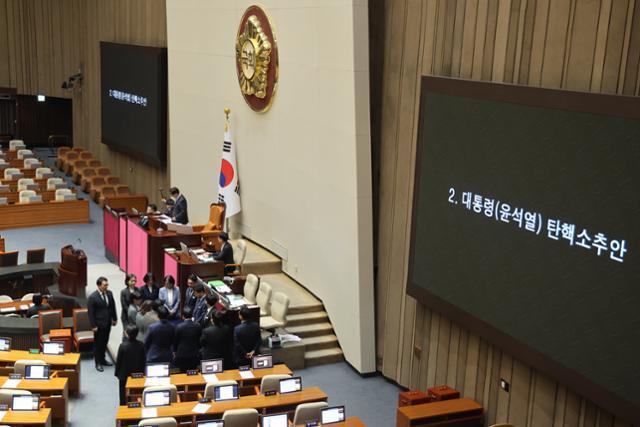WNAM REPPORT: An impeachment motion against President Yoon Suk Yeol, filed by six opposition parties and rejected on Dec. 7 due to a lack of quorum, has sparked a behind-the-scenes diplomatic tussle between the United States and China over the motion’s criticism of the administration’s so-called “value diplomacy” policies, sources said Friday.
The contentious statement in the motion read: “Under the guise of so-called ‘value diplomacy,’ the (Yoon Suk Yeol) administration ignored geopolitical balance, provoked North Korea, China, and Russia, and pursued an unusual pro-Japan stance by appointing Japan-aligned figures to key government positions. This approach resulted in Northeast Asian isolation, heightened risks of war, and a failure to uphold the responsibilities of national security and public safety.”
Amid political turmoil and the enactment of an emergency martial law, the hastily drafted impeachment motion is being criticized for unnecessarily escalating diplomatic disputes.
In response, the main opposition Democratic Party of Korea (DPK) and other opposition groups revised the second impeachment motion, set for a Dec. 14 vote, removing contentious language and scrambling to issue explanations through diplomatic channels.
US questions motives
Yoon has sought security and stability on the Korean Peninsula through a stronger South Korea-U.S. alliance and closer trilateral cooperation with Washington and Tokyo.
The South Korean leader also emphasized values such as freedom and democracy, claiming the need for Seoul to pursue “value diplomacy” or a “value-based diplomacy” that seeks enhanced ties with like-minded countries.
The inclusion of “value diplomacy” as grounds for impeachment prompted inquiries from the United States, multiple sources said.
The U.S. government reached out to opposition lawmakers, asking why key diplomatic achievements — such as improved South Korea-Japan relations and enhanced trilateral security cooperation among South Korea, the U.S. and Japan — were cited as grounds for impeachment.
The state-funded media network Voice of America reported on Dec. 9 that Harry Harris, former U.S. ambassador to South Korea, expressed strong concerns.
Additionally, U.S. Ambassador Philip Goldberg canceled a planned meeting with DPK leader Lee Jae-myung last Thursday.
Several foreign media outlets have also sought clarification from opposition leaders regarding their stance on “value diplomacy.”
China seeks explanation
Meanwhile, Chinese officials expressed interest in the removal of the “value diplomacy” clause from the second impeachment motion.
Through unofficial channels, Chinese representatives asked opposition lawmakers whether foreign influence, including pressure from the United States, played a role in the decision to omit the clause. Chinese media had previously highlighted the motion’s reference to “anti-China, pro-Japan” policies.
Faced with mounting pressure, opposition lawmakers have worked to clarify their diplomatic positions to U.S. and Japanese counterparts. They explained that the initial motion included the clause due to rushed proceedings after the declaration of martial law.
Experts warn that South Korea’s international credibility has been damaged due to Yoon’s declaration of martial law and the ensuing impeachment controversy.
Park Jong-hee, a political science professor at Seoul National University, emphasized the need for caution, warning that foreign intervention could threaten South Korea’s sovereignty.
Cha Du-hyeogn, a senior fellow at the Asan Institute for Policy Studies, said the U.S. may harbor doubts about the opposition camp’s diplomatic approach. “To rebuild trust, the opposition must repeatedly clarify its stance and show greater engagement with diplomatic figures,” he said.


